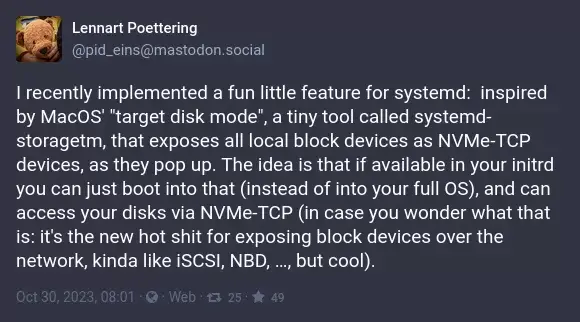327
you are viewing a single comment's thread
view the rest of the comments
view the rest of the comments
this post was submitted on 31 Oct 2023
327 points (95.8% liked)
Linux
47919 readers
1156 users here now
From Wikipedia, the free encyclopedia
Linux is a family of open source Unix-like operating systems based on the Linux kernel, an operating system kernel first released on September 17, 1991 by Linus Torvalds. Linux is typically packaged in a Linux distribution (or distro for short).
Distributions include the Linux kernel and supporting system software and libraries, many of which are provided by the GNU Project. Many Linux distributions use the word "Linux" in their name, but the Free Software Foundation uses the name GNU/Linux to emphasize the importance of GNU software, causing some controversy.
Rules
- Posts must be relevant to operating systems running the Linux kernel. GNU/Linux or otherwise.
- No misinformation
- No NSFW content
- No hate speech, bigotry, etc
Related Communities
Community icon by Alpár-Etele Méder, licensed under CC BY 3.0
founded 5 years ago
MODERATORS

Is this like booting over pxe? Is nvme tcp widely supported on motherboards?
No, this has nothing to do with your motherboard. Once you reach the boot menu you'll be able to pick your OS and alternatively
systemd-storagetm. If you chose the the latter then your disks will be available to other machines over NVME-TCP. Just like Apple.So when it's booted it will just advertise the storage to the LAN over nvme-tcp protocol?
Not "booted", you won't be booting your full OS. It's just an option on the boot menu that launches systemd and a small program that does the magic and nothing else.
So share drive / simplified NAS, no?
Kind of... but you're directly accessing the hard drive like iSCSI does. Way less latency, no high (and slow) protocols like SMB are used.
SAN. Not NAS.
But is it running at the same time as a an OS or is it just a device without an OS running, sharing storage?
So NAS without any controls. Yay?
trivial to set up NAS with minimal overhead, plus you can boot any pc into this once it's standard, which would be nice for rescuing when you fuck something up: rather than fiddle around with rescue mode or digging out the drives you just boot into this mode and access the drives from your laptop or whatever.
It doesn't sound easier than ventoy tbh.